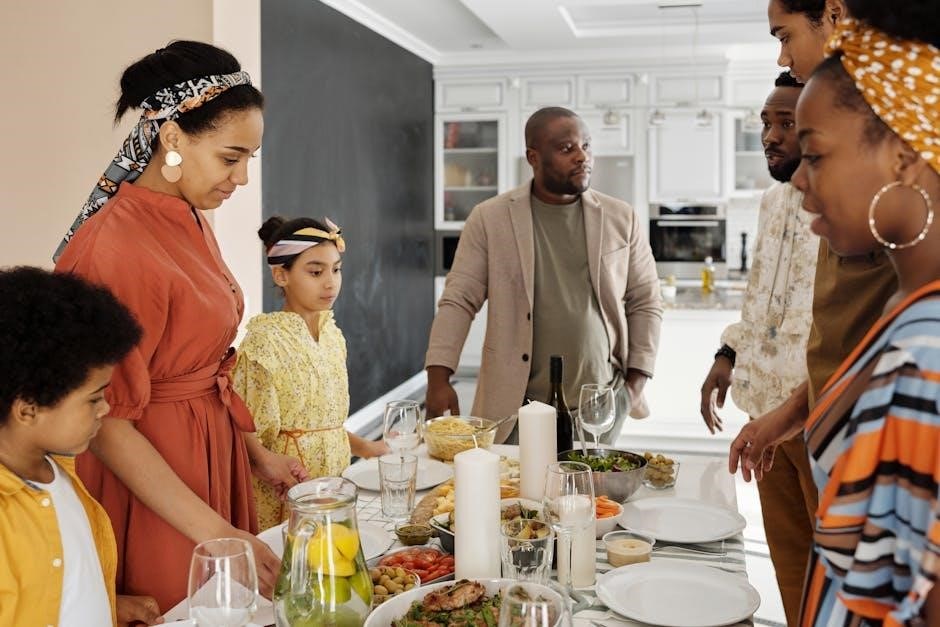a guide to being just friends
Platonic relationships are built on trust, communication, and mutual respect, forming a strong foundation for lasting connections without romantic expectations. Setting boundaries and understanding each other’s needs is essential for maintaining a healthy dynamic. A Guide to Being Just Friends explores the nuances of friendship, offering practical advice to nurture meaningful relationships.
1.1 Understanding the Concept of Platonic Relationships
A platonic relationship is a deep, non-romantic connection between two individuals, rooted in trust, respect, and mutual understanding. It thrives on emotional intimacy without physical or romantic expectations. Setting clear boundaries is crucial to maintaining this dynamic, as highlighted in Sophie Sullivan’s A Guide to Being Just Friends. Platonic relationships often involve shared interests, open communication, and a commitment to supporting one another. They provide a sense of companionship and belonging, enriching lives without the complexities of romance. Understanding this concept is key to fostering healthy, lasting friendships.
1.2 The Importance of Boundaries in Friendship
Boundaries are fundamental to any healthy friendship, ensuring both parties feel respected and comfortable. They prevent misunderstandings and emotional overstepping, fostering a safe environment for trust to grow. Setting clear limits helps maintain the platonic nature of the relationship, avoiding potential romantic confusion. By vocalizing your expectations and respecting your friend’s needs, you create a balanced dynamic. Boundaries also protect individual identities, allowing each person to grow independently. As emphasized in A Guide to Being Just Friends, establishing and honoring these limits is essential for a strong, enduring connection built on mutual respect and understanding.

Building a Strong Foundation for Friendship
Trust, communication, and mutual respect are vital for building a strong friendship foundation. These elements ensure a stable and enduring platonic relationship.
2.1 How to Meet New Friends
Meeting new friends involves stepping out of your comfort zone and engaging in social activities. Join clubs, attend events, or take classes aligned with your interests. Being approachable and open-minded fosters connections. Strike up conversations by showing genuine interest in others. Listen actively and ask questions to build rapport. Patience and persistence are key, as meaningful friendships develop over time. Expanding your social circle can lead to unexpected, rewarding relationships that enrich your life.
2.2 Establishing Trust and Communication
Trust and open communication are the pillars of a strong friendship. Being honest and transparent fosters a sense of reliability, allowing both parties to feel secure. Active listening and empathy encourage deeper connections. Regular check-ins and expressing appreciation can strengthen bonds. Sharing personal experiences and thoughts builds intimacy without crossing boundaries. Clear communication helps avoid misunderstandings and ensures both friends feel valued. Vocalizing your feelings respectfully and being receptive to feedback sustains trust and understanding, creating a foundation for a lasting and meaningful relationship.
Maintaining a Healthy Friendship
Maintaining a healthy friendship requires respect, trust, and clear boundaries. Engaging in shared activities and open communication strengthens the bond, ensuring a balanced and fulfilling relationship over time.
3;1 Respecting Personal Space and Boundaries
Respecting personal space and boundaries is crucial for maintaining a healthy friendship. By vocalizing your needs and understanding your friend’s comfort levels, you ensure a balanced dynamic. Setting clear boundaries prevents misunderstandings and fosters trust. It’s essential to communicate openly about what you are and aren’t comfortable with, creating a respectful environment where both individuals feel valued. This mutual respect strengthens the foundation of your relationship, allowing it to grow without unnecessary tension or conflict. By prioritizing boundaries, you build a friendship rooted in trust and understanding.
3.2 The Role of Open and Honest Communication
Open and honest communication is the backbone of any healthy friendship. Being able to express your thoughts and feelings freely fosters trust and understanding. Active listening and clarity in your words ensure that both parties feel heard and valued. Regular check-ins and transparent conversations help prevent misunderstandings and strengthen the bond. By being honest about your needs and feelings, you create a safe space for your friend to do the same, building a relationship rooted in mutual respect and trust. This foundation is essential for navigating life’s challenges together as friends.

Avoiding Misunderstandings
Avoiding misunderstandings requires clear communication and transparency. Being proactive in addressing potential issues before they escalate helps maintain trust and strengthens the friendship.
4.1 How to Handle Potential Misinterpretations
Addressing potential misinterpretations involves open dialogue and empathy. Active listening ensures both parties feel heard, reducing conflicts. Clarifying intentions early prevents misunderstandings from escalating. Setting clear boundaries and expressing feelings honestly fosters trust. Regular check-ins can help identify and resolve issues before they grow. By fostering a culture of transparency, friendships can navigate miscommunications smoothly, ensuring mutual respect and understanding. This proactive approach strengthens the bond and maintains harmony in the relationship.
4.2 The Impact of Social Media on Friendships
Social media can blur the lines in platonic relationships, often leading to misunderstandings. Overanalyzing posts or interactions can create unnecessary tension. Setting boundaries and avoiding excessive online engagement helps maintain clarity. While platforms offer ways to stay connected, they can also distort perceptions of closeness. Prioritizing real-life communication ensures genuine connection. Being mindful of how social media is used can prevent misinterpretations and protect the friendship from unnecessary drama, fostering a healthier dynamic and mutual respect. Balancing online interactions with personal boundaries is key to preserving trust and understanding in platonic relationships.

Activities to Strengthen Your Friendship
Engaging in fun activities like shared hobbies, outdoor adventures, and creative projects fosters deeper connections. Spending quality time together through cooking, games, or exploring new places strengthens trust and creates lasting memories.

5.1 Fun and Engaging Things to Do Together
Engaging in fun activities strengthens friendships and creates lasting memories. Consider trying new restaurants, visiting museums, or attending concerts. Outdoor adventures like hiking or biking promote bonding. Creative workshops, cooking classes, or art sessions foster collaboration and laughter. Board games, trivia nights, or karaoke offer lighthearted fun. Volunteering together for a cause you both care about deepens trust and shared purpose. Exploring new places, whether locally or during a weekend trip, sparks excitement. Whatever you choose, the key is to enjoy each other’s company and create meaningful experiences that nurture your platonic connection.
5.2 The Value of Shared Experiences
Shared experiences are the backbone of strong friendships, fostering trust, empathy, and mutual understanding. Whether it’s traveling together, attending events, or overcoming challenges, these moments create lasting memories. Shared laughter, adventures, and even quiet moments of connection deepen the bond between friends. These experiences not only strengthen the foundation of the relationship but also provide a sense of belonging and camaraderie. By engaging in meaningful activities together, friends build a shared history that enriches their connection and underscores the value of platonic love and companionship. Shared experiences are the threads that weave a friendship into a lasting and fulfilling relationship.

Handling Potential Romantic Feelings
Addressing romantic feelings requires honesty and boundaries. Open communication helps clarify emotions, ensuring the friendship remains intact. Vocalizing your intentions and valuing the relationship is essential.
6.1 Recognizing and Addressing Unwanted Emotions
Unwanted romantic feelings can complicate friendships, making it essential to acknowledge and address them early. Open communication is key to understanding emotions and maintaining the platonic dynamic. Expressing your feelings honestly allows both parties to align their expectations and set clear boundaries. It’s important to prioritize the friendship and avoid actions that might signal romantic interest. By addressing these emotions respectfully, you can preserve trust and strengthen the bond. Remember, clarity and mutual respect are vital for a healthy, enduring friendship free from misunderstandings or unspoken tensions.
6.2 Maintaining Friendship After Rejection
Maintaining a friendship after rejection requires empathy, understanding, and clear communication. It’s important to acknowledge the feelings of both parties and give each other space if needed. Openly discussing the situation can help clarify intentions and prevent misunderstandings. Reaffirming the value of the friendship and setting boundaries ensures the relationship remains platonic. Respect and honesty are key to preserving trust and fostering a strong bond. By addressing the situation with maturity, you can navigate this challenging phase and emerge with a healthier, more resilient friendship.
Nurturing platonic relationships requires mutual respect, trust, and open communication. By setting boundaries and valuing shared experiences, friendships flourish, creating meaningful connections that enrich our lives profoundly.

7.1 Summarizing the Guide to Being Just Friends
A Guide to Being Just Friends emphasizes the importance of trust, communication, and boundaries in platonic relationships. By prioritizing mutual respect and understanding, friendships can thrive without romantic expectations. The guide highlights practical tips for meeting new friends, maintaining healthy dynamics, and avoiding misunderstandings. It also explores the impact of social media and the value of shared experiences. Ultimately, the guide provides a roadmap for fostering meaningful connections, ensuring that platonic relationships remain fulfilling and enriching for all parties involved.
7.2 Final Thoughts on Nurturing Platonic Relationships
Nurturing platonic relationships requires consistent effort, empathy, and open communication. By setting clear boundaries and valuing mutual respect, friendships can flourish without misunderstandings. Shared experiences and trust are the cornerstones of lasting connections. Embrace the beauty of platonic love, as it enriches your life with support, joy, and camaraderie. Remember, true friends are treasures worth cherishing and investing time in. Cultivate these relationships with care, and they will bring fulfillment and happiness to your life for years to come.